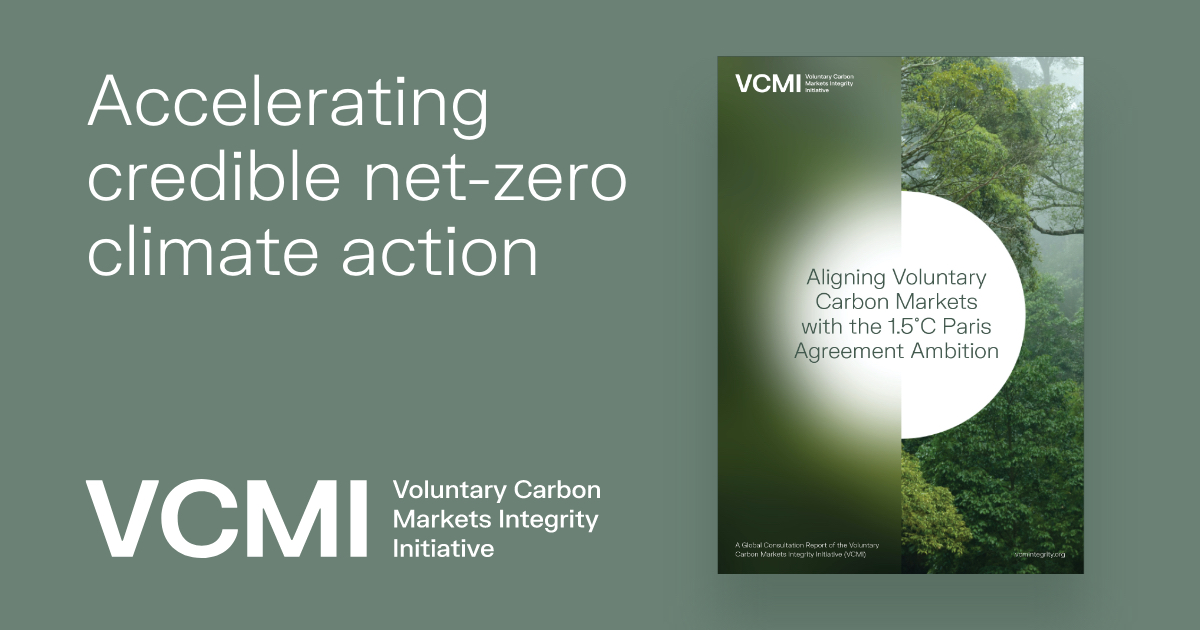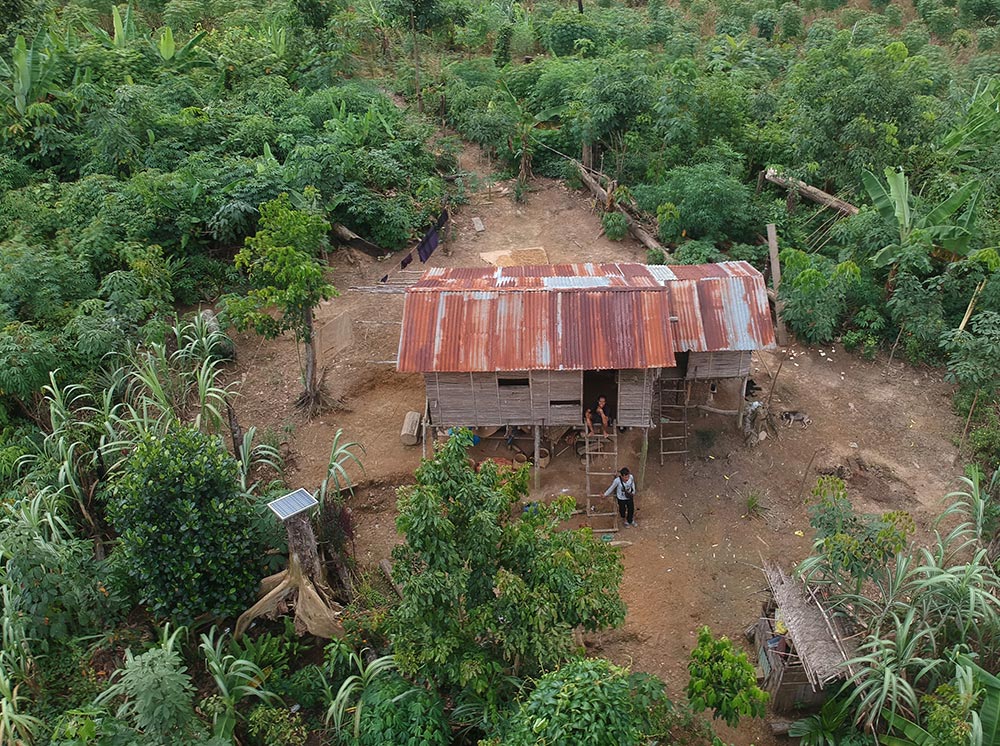Major global initiative to bring rigour and transparency to net zero and carbon neutral claims
A significant new initiative, launching today, will focus on improving the integrity of voluntary carbon markets to help ensure they play a credible role in keeping global warming to 1.5C.
With voluntary carbon markets poised to grow exponentially this decade, the Voluntary Carbon Markets Integrity Initiative (VCMI) aims to help ensure that credibility concerns are addressed so that these markets fulfil their potential to support the goals of the Paris Agreement. VCMI will do this by working on a number of critical gaps in voluntary carbon market integrity – building solid foundations as the market scales.
VCMI will initially focus on how businesses can make climate claims – like “net zero” and “carbon neutral” – that are robust and underpinned by science-based action on reducing greenhouse gas emissions.
Voluntary carbon markets enable companies to purchase carbon credits from activities that reduce or remove greenhouse gas emissions. To fulfil their climate action claims, some businesses may use these carbon credits to help address their greenhouse gas emissions. But these actions should complement rather than substitute for ambitious direct reductions in their own emissions.
Purchasing carbon credits could play an important role in global climate action if they are of high-quality, used in addition to ambitious decarbonisation, and delivered in a way that works for the nations, Indigenous Peoples, and local communities that host projects.
VCMI aims to support private sector climate action by developing guidance on the use of carbon credits and transparent claims, and promoting multi-stakeholder engagement and partnerships so that this translates into meaningful action on the ground.
VCMI will also support countries to access high-quality climate finance, working with governments and the United Nations Development Programme to establish VCM Access Strategies – a project to channel private finance from high-integrity voluntary carbon markets towards national climate priorities.
The initiative has been launched with co-funding by the UK Government and Children’s Investment Fund Foundation, and is supported by the COP26 Presidency and United Nations Development Programme. The move has been welcomed by civil society and business groups, and governments including Germany, Cambodia, Ghana, Democratic Republic of the Congo, Kenya, and two Mexican states, alongside the US Special Presidential Envoy for Climate.
VCMI has launched a first consultation with stakeholders from civil society, the private sector, Indigenous Peoples’ groups, governments, and others to gather views on how carbon credits can be voluntarily used and claimed by businesses as part of credible net zero strategies.
This work will form the building blocks of recommended actions to bring integrity to private sector climate action – with proposed guidelines expected in late 2021.
VCMI will be overseen by a Steering Committee, which will be Co-Chaired by Rachel Kyte, Dean of The Fletcher School at Tufts University, and Tariye Gbadegesin, Managing Director and Chief Executive Officer at ARM-Harith Infrastructure Investment LTD.
Supporting the initiative will be the secretariat housed by Meridian Institute, a US-based non-profit organisation, and an Expert Advisory Group, which brings together leading authorities on voluntary carbon markets and climate change – as part of a wider structure that ensures businesses, governments, NGOs, Indigenous Peoples, local communities, and civil society have a strong voice in the initiative.
VCMI will work with complementary initiatives – including the Taskforce on Scaling Voluntary Carbon Markets and the Science Based Targets Initiative, who have welcomed the launch of VCMI.
VCMI’s Consultation Report can be downloaded here and their global launch, which will take place at 1pm BST on Thursday 29 July, can be viewed here.
QUOTES:
Rachel Kyte, Co-Chair, VCMI, said: “The science is clear – we must keep global warming below 1.5C. Voluntary carbon markets may play an important role in channelling finance to the protection and restoration of nature, when transparent and based on a common and agreed framework of integrity.
“VCMI is an important multistakeholder effort to build a working consensus around how we assure the integrity of voluntary markets so that they lead to reductions emissions and support aggressive countries’ climate ambitions. The issue of integrity is an essential piece of the foundation of the new architecture of climate cooperation.”
Tariye Gbadegesin, Co-Chair, VCMI, said: “It’s absolutely critical that we work hand in hand with representatives from tropical forest countries and Indigenous Peoples, so that we can create a successful and equitable voluntary carbon market that works for everyone.
“In my 20 years as an investment professional in Africa, I’ve seen first-hand how important it is to mobilise private sector finance for climate change action. VCMI presents a significant opportunity to channel funding into these critical efforts, but as the markets scale, their integrity needs to be assured and aligned with net zero principles.”
Alok Sharma, COP26 President-Designate, said: “I am pleased to support the launch of the VCMI today and to be joined by ministers from across the world to kick start this initiative, which will bring clarity and integrity to voluntary carbon markets and their operations.
“A robust voluntary carbon market can incentivise emissions reductions, encourage technology innovation, and promote reforestation while also helping to raise finance to tackle climate change.
“I urge all governments, businesses, civil society organisations and Indigenous Peoples to engage as fully as possible with VCMI’s work. Together, let’s build our resilience, drive down global emissions, and keep 1.5 degrees alive.”
John Kerry, US Special Presidential Envoy for Climate, said: “We must reach net zero emissions globally by 2050. To get there, companies should drastically reduce their own emissions. They may also support climate actions beyond their business. We welcome the VCMI’s focus on clear norms for companies to use high-quality carbon credits, including toward their net zero targets in a way that is credible, transparent, and aligned with the goal to limit global warming to 1.5 degrees.”
Anne-Marie Trevelyan, Minister for Energy, Clean Growth and Climate Change, said:
“Carbon markets can be catalytic in driving green innovation and today’s launch of the UK’s Voluntary Carbon Market Integrity Initiative will help in making greenwashing a thing of the past and ensuring climate targets are underpinned by real action.
“I am thrilled to support this initiative that is bringing together governments and businesses to mobilise and increase private finance and deliver sustainable economies around the globe.”
Kate Hampton, CEO, Children’s Investment Fund Foundation, said: “Voluntary carbon markets have the potential to channel private finance towards urgent climate action, but this comes with risks. I’m honoured to be on the VCMI Steering Committee that CIFF is supporting to ensure transparent, well governed, high-quality markets, and to ensure that they’re scaled in a way that strengthens the credibility of corporate net zero commitments, and ultimately delivers on the goals of the Paris Agreement.”
Achim Steiner, Administrator, United Nations Development Programme, said: “VCMI will serve a unique role providing critical guidance on how voluntary carbon credits can be used and claimed as part of credible decarbonisation strategies. This support will be vital to mobilise new levels of private sector finance towards the Paris Agreement targets and the Sustainable Development Goals. The United Nations Development Programme is already working closely with the VCMI – that includes engaging tropical forest countries to develop voluntary carbon market access strategies. As we work to COP26, UNDP is proud to support the vital work of VCMI to ensure the integrity of voluntary carbon markets as part of the decisive long-term climate action that we now need.”
Dominic Waughray, Managing Director, World Economic Forum, said: “Voluntary carbon markets have seen an incredible uptake over the last years and the VCMI plays a hugely important role in building trust and ensuring integrity and ambition in this space. The World Economic Forum welcomes VCMI and we’re proud to support this effort.”
Hon. Samuel A. Jinapor MP, Ghana Ministry of Lands and Natural Resources, said: “Ghana supports VCMI to provide the necessary benchmarks for transparency, accountability, additionality, inclusivity, and permanence in voluntary carbon market transactions. We believe that voluntary market carbon should complement compliance markets within the robust national framework for adaptability, monitoring, and continuous improvements. As Ghana’s sectoral Minister for Lands and Natural Resources, and considering Ghana’s immense achievements under REDD+, I support VCMI to ensure Ghana secures trusted partnerships that unlock and release climate finance for verifiable and tangible impacts.”
Paris Chuop, Ministry of Environment, Cambodia, said: “In Cambodia, we have significant progress and experience with voluntary carbon markets. We have worked very hard with the UN, civil society organisations, and private sector partners to develop REDD+ projects to support natural resource management and to promote community livelihood development in the project area. In the meantime, we are drafting regulation to set out mechanisms to manage all REDD+ projects in a nesting system, aiming at getting results with payments in the near future. While we have done all this effort on the supply-side, we need clear and transparent mechanisms on the demand-side to ensure that mitigation commitments from buyers are transparent and of high quality. This is where the VCMI work is so crucial, and this is why Cambodia is pleased to support this initiative.”
Dr Chris Kiptoo, Principal Secretary, Ministry of Environment & Forestry, Kenya, said: “The government of Kenya is committed to combating climate change. It has therefore been at the forefront in establishing the relevant institutional, policy, and legal frameworks to achieve low-emission, climate-resilient development. On behalf of the government of Kenya, I wish to express my full support to the VMCI, and I look forward to a fruitful collaboration between the government of Kenya and the VCMI.”
Sergio Humberto Graf Montero, Secretary of the Environment and Territorial Development, State Government of Jalisco, said: “Jalisco State is excited to welcome the launch of VCMI. We will actively participate in the development of the guidelines for using credits from voluntary carbon markets as part of credible strategies towards decarbonization.”
Sayda Rodríguez Gómez, Secretary of Sustainable Development, State Government of Yucatan, said: “In Yucatan, we see voluntary carbon markets as an opportunity to design and implement conservation and restoration strategies leading to solutions in benefit of everyone, with an integrated vision that takes us to more sustainable ecosystems and communities. We welcome VCMI and look forward to working with them.”
Nigel Topping, High Level Climate Champion for COP26, said: “Companies are increasingly stepping up to help accelerate a green and resilient recovery – voluntary carbon markets can play a critical role, but we must they are used in addition, and not as an alternative, to ambitious action to reduce direct emissions in line with science-based targets. As a High Level Climate Champion, I’m pleased to see VCMI established and look forward to supporting it to deliver.”
Carlos Manuel Rodriguez, CEO and Chairperson, GEF, said: “I strongly believe that carbon markets can play a major role to mobilise private sector resources to accelerate the implementation of the Paris Agreement. If done right, voluntary carbon programmes can be effective to empower local communities as stewards of environmental conservation and to achieve both climate and biodiversity objectives.
“For this to happen, integrity is key – it is a prerequisite to generate trust and support on the demand. This initiative couldn’t be more important, especially for the many developing countries with large portions of pristine ecosystems. I am convinced that this initiative can go a long way to help us get on the path towards a climate neutral and nature-positive society well before 2050.”
Bill Winters, CEO, Standard Chartered and Chair, Taskforce on Scaling Voluntary Carbon Markets, said: “I’m delighted to be working with VCMI as they set out the comprehensive framework around corporate claims, which is a critical component of this overall system that we’re putting in place to ensure we get to that net zero end point and with appropriate compensation for emissions on the path to net zero.”
Alberto Carillo Pineda, Managing Director, the Science Based Targets Initiative (SBTi), said: “In the fight to limit warming to 1.5c, it is critical to mobilise the corporate sector not only to reduce emissions, but also to scale up finance. There are no shortcuts. We need companies to embark on a science-based decarbonisation trajectory, but we also need them to contribute to close the finance gap. We trust VCMI will help bring integrity to the way companies engage in carbon markets, ensuring high quality sustainable interventions, and helping avoid claims and practices that can be misleading.”
Wulf-Peter Schmidt, Director Sustainability, Advanced Regulation & Product Conformity, Ford of Europe said: “There is only a very limited carbon budget left to stay within 1.5 degrees globally. Ford’s disruptive all-in on electrification strategy in Europe is addressing this urgently. With long automotive lead times, voluntary carbon markets can offer an opportunity to accelerate by helping others with shorter lead times. I expect VCMI to guide to what are truly incremental carbon offsets with transparent communication and strict conditions.”
Hindou Ibrahim, Coordinator, Association of Peul Women and Autochthonous Peoples of Chad (AFPAT), said: “Voluntary carbon market investment in natural climate solutions has the potential – only if it is done right – to accelerate climate mitigation while increasing much needed finance for natural climate solutions. Doing it right means respecting the rights, land, and territories of Indigenous Peoples; supporting projects governed by Indigenous Peoples and local communities while increasing finance for community conservations; and ensuring gender, social, and environmental standards.”
Peter Bakker, President and CEO, World Business Council for Sustainable Development (WBCSD), said: “The voluntary carbon markets can accelerate business action for a 1.5 degree C world by channelling urgently needed financing towards new technologies and investments in nature that can support decarbonization and remove carbon from the atmosphere. As a convenor of the Natural Climate Solutions Alliance, a multistakeholder initiative providing guidance to the private sector on how to invest in high-quality Natural Climate Solutions credits for the benefit of climate, nature and communities, WBCSD welcomes the launch of the Voluntary Carbon Market Integrity Initiative as a complementary voice working to build trust in the use of carbon credits by business to meet shared climate goals.”
Nicolette Bartlett, Executive Director, CDP, said: “I’m delighted to see the emergence of this initiative, focusing on the integrity of demand from the private sector for voluntary carbon credits. CDP supports the initiative and stands ready to help drive this, ensuring that companies set and focus on science-based decarbonisation targets, and then supporting the mitigation efforts facilitated through the markets in addition to their reduction efforts.”
Craig Hanson, Vice President for Food, Forest, Water & the Ocean, World Resources Institute, said: “I’d like to welcome the launch of the Voluntary Carbon Markets Integrity Initiative. If climate is to be saved, as well as the world’s natural ecosystems, we need to be sure that nature-based solutions have both demand-side and supply-side integrity. I believe, and the world hopes, VCMI will help achieve that integrity.”
Manuel Pulgar-Vidal, Leader, Climate and Energy Practice, WWF International, said: “The climate crisis is an urgency like no other, so we must focus our efforts into ambitious emissions with action. If carbon markets have a role to play, they must be designed and operated to follow high integrity principles, such as those that the Voluntary Carbon Markets Integrity Initiative has laid out. We welcome the launch of VCMI, and the important work of which the initiative will embark.”




